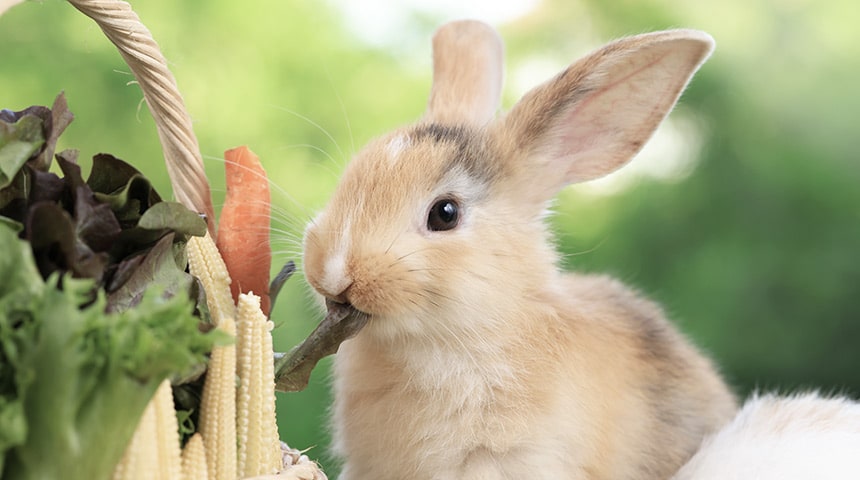
Rabbits are particularly sensitive animals to the level of calcium in their diet. Calcium predisposes to the development of urinary stones and kidney problems. To avoid this, it is advisable to provide rabbit food that’s low in calcium (ex: Oxbow, Oxbow Select Garden) and to control the calcium intake in their daily vegetables. Alfalfa or barnyard hay is very high in calcium and should be avoided. We recommend hay consisting of timothy, oats, meadow and/or orchard cereals.
Foods with a high calcium level (more than 90 mg of calcium per 100 g)
To be given in small quantities
- Fresh thyme (405 mg)
- Dandelion* (187-206 mg)
- Lamb’s lettuce (309 mg)
- Dill (208 mg)
- Borschool Cabbage/Kale*,**(94-150 mg)
- Collard Greens*,** (113-232 mg)
- Spinach* (90-99 mg)
- Arugula (160 mg)
- Parsley* (123-138 mg)
- Rapini/Broccoli-Robe (108 mg)
- Watercress (100-120 mg)
- Turnip greens* (150-190 mg)
- Mint (243 mg)
- Mustard greens (115 mg )
- Basil (177 mg)
- Beet greens* (117 mg)
- Spring mix (160 mg)
- Chinese broccoli (80-100 mg)
- Carrot leaves* (340 mg)
- Escarole/Chicory* (52-100 mg)
- Chinese cabbage (Bok choi)** (73-105 mg)
Foods with a moderate level of calcium (more than 40-90 mg of calcium per 100 g)
To be given in moderation
- Red cabbage** (45 mg)
- Brussels sprouts*,** (38-42 mg)
- Broccoli*, ** (42-72 mg) Cilantro (67 mg)
- Celery* (16-48 mg)
- Swiss chard* (40-54 mg)
- Celeriac (40-43 mg)
- Sprouts (51 mg)
- Rutabaga*, ** (41-43 mg)
- Squash (acorn or butternut) (33-48 mg)
- Parsnip* (36-45 mg)
- Fennel (49 mg)
Foods with a low calcium level (less than 40 mg of calcium per 100 g)
To be given in large quantities
- Spaghetti squash (23 mg)
- Zucchini * (12-16 mg)
- Cabbage (green, Savoy, nape)** (29-40 mg)
- Radicchio (19-20 mg)
- Cauliflower** (22 mg)
- Lettuce (all except iceberg) (20-36 mg)
- Cucumber (4-16 mg)
- Carrot* (19-33 mg)
- Peppers (green*, red, yellow) (7-10 mg)
- Turnip ** (30 mg)
- Pumpkin (18-21 mg)
- Celery* (16-48 mg)
- Squash (acorn or butternut) (33-48 mg)
*: Foods to be given in moderate quantities, because these contain sugar in moderate or large quantities.
**: Foods to be given in moderate quantities, as these can cause bloating and intestinal gas. (To be avoided for rabbits who are sensitive to digestive stasis)
For more information, don’t hesitate to contact us!

